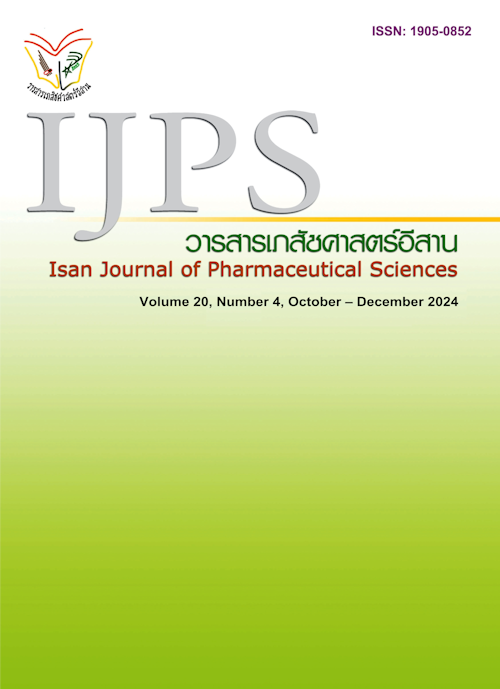การประเมินการประสานรายการยาที่นำโดยเภสัชกรที่หอผู้ป่วยศัลยกรรมของโรงพยาบาลทั่วไปแห่งหนึ่ง
Main Article Content
บทคัดย่อ
การประสานรายการยา เป็นมาตรฐานหนึ่งในระบบยาเพื่อลดความคลาดเคลื่อนทางยาที่อาจจะเกิดขึ้น วัตถุประสงค์: เพื่อพัฒนาการประสานรายการยา และศึกษาความคลาดเคลื่อนทางยา ระยะเวลาที่ใช้ในการประสานรายการยา รวมทั้งความพึงพอใจของบุคลากรทางการแพทย์ วิธีดำเนินการวิจัย: รูปแบบของงานวิจัยนี้เป็นเชิงพรรณนาแบบเก็บข้อมูลไปข้างหน้า กลุ่มตัวอย่าง คือ ผู้ป่วยในหอผู้ป่วยแผนกศัลยกรรมและใช้ยารักษาโรคเรื้อรังอย่างน้อย 1 รายการ การประสานรายการยามีการดำเนินการครบทั้ง 4 ขั้นตอน โดยมีการวิเคราะห์อัตราการเกิดความคลาดเคลื่อนทางยา ประเภทและระดับความรุนแรงของความคลาดเคลื่อนทางยา ระยะเวลาของการประสานรายการยา และความพึงพอใจของบุคลากรทางการแพทย์ ใช้สถิติเชิงพรรณนา ส่วนปัจจัยที่มีความสัมพันธ์กับการเกิดความคลาดเคลื่อนทางยา ใช้การทดสอบไคสแควร์ ผลการวิจัย: กลุ่มตัวอย่างในการศึกษานี้มีจำนวน 243 ราย พบอัตราการเกิดความคลาดเคลื่อนทางยาในขั้นตอนแรกรับร้อยละ 28.1 และขั้นตอนจำหน่ายร้อยละ 15.0 ประเภทความแตกต่างของรายการยาทั้งในขั้นตอนแรกรับและจำหน่ายส่วนใหญ่เกิดจากความไม่ตั้งใจของแพทย์ (ร้อยละ 44.4) ประเภทของความคลาดเคลื่อนทางยาพบการไม่ได้รับยาเดิมมากที่สุด (ร้อยละ 79.1) ซึ่งเป็นความคลาดเคลื่อนทางยาระดับ B (ไม่เป็นอันตราย เนื่องจากยังไม่ถึงผู้ป่วย) มากที่สุด (ร้อยละ 64.6) และส่วนใหญ่แพทย์ยอมรับข้อเสนอการแก้ไข (ร้อยละ 75.5) นอกจากนี้ยังพบว่าระยะเวลาการนอนโรงพยาบาลและจำนวนรายการยาที่ผู้ป่วยได้รับก่อนจำหน่ายมีความสัมพันธ์กับการเกิดความคลาดเคลื่อนทางยาอย่างมีนัยสำคัญ (p <0.05) สำหรับระยะเวลาที่ใช้ในการประสานรายการยาต่อผู้ป่วย 1 ราย มีค่ามัธยฐานเท่ากับ 28 นาที (IQR 21, 33) โดยขั้นตอนการรวบรวมและการทวนสอบรายการยาใช้ระยะเวลามากที่สุด และบุคลากรทางการแพทย์มีความพึงพอใจต่อการประสานรายการยาในระดับมากที่สุด (ร้อยละ 92.4) สรุป: การประสานรายการยาเป็นกระบวนการสำคัญที่เพิ่มความปลอดภัยในการใช้ยาให้กับผู้ป่วย สามารถป้องกันความคลาดเคลื่อนทางยาตั้งแต่ขั้นตอนแรกรับจนกระทั่งขั้นตอนจำหน่าย และเป็นการเพิ่มบทบาทของเภสัชกรในการทำงานร่วมกับทีมสหสาขาวิชาชีพในโรงพยาบาลด้วย
Article Details

อนุญาตภายใต้เงื่อนไข Creative Commons Attribution-NonCommercial-NoDerivatives 4.0 International License.
กรณีที่ใช้บางส่วนจากผลงานของผู้อื่น ผู้นิพนธ์ต้อง ยืนยันว่าได้รับการอนุญาต (permission) ให้ใช้ผลงานบางส่วนจากผู้นิพนธ์ต้นฉบับ (Original author) เรียบร้อยแล้ว และต้องแนบเอกสารหลักฐาน ว่าได้รับการอนุญาต (permission) ประกอบมาด้วย
เอกสารอ้างอิง
Al-Rashoud I, Al-Ammari M, Al-Jadhey H, Alkatheri A, Poff G, Aldebasi T, et al. Medication discrepancies identified during medication reconciliation among medical patients at a tertiary care hospital. Saudi Pharm J. 2017; 25(7):1082-1085.
Bureau of Non-communicable Diseases, Department of Disease Control. NCD Clinic Plus operational guidelines 2019 [Online]. 2020 May 1 [cited 2024 Oct 1]. Available from: http://ncdclinicplus.ddc.moph.go.th/pages/public/files/view.php?id=1673855257
Chanatepaporn P, Anutchatchaval S, Nakornratanachai P. Development of Medication Reconciliation at Female-Medicine Ward in Srinagarind Hospital. Srinagarind Med J. 2016; 29(3): 276-282.
Daniel WW, Cross CL. Biostatistics: A Foundation for Analysis in the Health Sciences. 7th ed. New York: John Wiley & Sons; 1999.
Farha RA, Yousef A, Gharaibeh L, Alkhalaileh W, Mukattash T, Alefishat4 E. Medication discrepancies among hospitalized patients with hypertension: assessment of prevalence and risk factors. BMC Health Serv Res. 2021; 21(1):1338.
Healthcare Accreditation Institute (Public Organization). Hospital and Health Service (HA) standards 4th Edition [Online]. 2018 Jul 1 [cited 2023 Mar 22]. Available from: http://www.tqa.pcmc.swu.ac.th/Portals/2081/Documents/HA%20Standard%20HA_4th%20Edition.pdf
Healthcare Accreditation Institute (Public Organization). Hospital and Health Service (HA) standards 5th Edition [Online]. 2022 Oct 1 [cited 2023 Mar 22]. Available from: https://www.backend.ha.or.th/fileupload/DOCUMENT/00148/77c77e3f-ed2f-41a9-90d4-22164a69a871.pdf
Healthcare Accreditation Institute (Public Organization). Patient Safety Goals: Simple Thailand 2018. [Online]. 2018 Sep 1 [cite 2023 Mar 22]. Available from: http://134.236.247.146:8080/edoc1/uploads/DocNum_20211110172458.pdf
Hospital Pharmacy Association (Thailand). Hospital pharmacy professional standards 2018–2022 [online]. 2018 Jul 1 [cited 2023 Mar 22]. Available from:https://www.thaihp.org/download/HospitalPharmacyProfessionalStandards2018-2022.pdf.
Institute for Safe Medication Practices (ISMP). ISMP Medication Safety Self Assessment for Hospital [Online]. 2011 Dec 1 [cited 2023 Mar 31]. Available from: https://www.ismp.org/sites/default/files/attachments/2018-01/2011%20ISMP%20Medication%20Safety%20Self%20Assessment_Full.pdf
Jantachotikun V, Rattanakom T. The role of multidisciplinary team in preventing medication errors. Kb Med J. 2020; 3(1):61-76.
Kiettanawattana P. Development of Admission Medication Reconciliation in Songklanagarind Hospital. Thai Bull Pharm Sci. 2023; 19(2):149-163.
Mayachearw K, Wongpoowarak P. Effects of Medication Reconciliation Process at Surgical Wards in a Regional Hospital. Thai J Pharm Prac. 2015; 8(1):35-47.
Meehanpong P, Chatdokmaiprai K. Assessing Quality of Research Instrument in Nursing Research. JRTAN 2018; 19(1):9-15.
National Coordinating Council for Medication Error Reporting and Prevention. NCC MERP index for categorizing medication error [online]. 2001 Dec 31 [cited 2023 Apr 16]. Available from: URL: http://www.nccmerp.org/pdf/indexBW2001-06-12.pdf
Nguyen AD, Lam A, Banakh I, Lam S, Crofts T. Improved Medication Management With Introduction of a Perioperative and Prescribing Pharmacist Service. J Pharm Pharmacol. 2020; 33(3):299-305.
Nuntasena K. The Study of Medication Error, Cost Savings and Cost Avoidance of Medication Reconciliation at Inpatient Department, Khao Suan Kwang Hospital, Khon Kaen Province. J Khon Kaen Provincial Health Office. 2021; 3(1):21-38.
Pattanajak C, Rachada P. Effect of Medication Reconciliation at Female Medical Ward of One General Hospital. Thai J Hosp Pharm. 2023; 33(3):298-307.
Phromkhot C, Rattanamahattana M. Development and Evaluation of a Hospital Medication Reconciliation Process: A Case Study for Diabetic In – patient Service at a Mid - level General Hospital in the Northeast Region. Isan J Pharm Sci. 2017; 13(3):49-58.
Piriyachananusorn N, Chalortham N, Kitikannakorn N. Improvement and Evaluation of Medication Reconciliation at Orthopedic Wards in a Regional Hospital. Thai J Pharm Prac. 2022; 15(3):750-765.
Praphanwattana M. Medication reconciliation. Phitsanulok: Naresuan University; 2011. 243-281.
Puntakul K, Topark-Ngarm A. Medication Reconciliation at Nakhon Ratchasima Rajanagarindra Psychiatric Hospital. Isan J Pharm Sci 2012; 8(2):27-40.
Saithai S, Wongpoowarak P. Outcomes of Medication Reconciliation at the Female Medical Ward in a General Hospital. Thai J Pharm Prac. 2013; 5(1):2-15.
Stuijt CCM, Bemt BJFvd, Boerlage VE, Janssen MJA, Taxis K, Karapinar‐Çarkit F. Differences in medication reconciliation interventions between six hospitals: a mixed method study. BMC Health Serv Res. 2022; 22(1):722.
Tam VC, Knowles SR, Cornish PL, Fine N, Marchesano R, Etchells EE. Frequency, type and clinical importance of medication history errors at admission to hospital: a systematic review. CMAJ. 2005; 173(5):510-515.
Thima K, U-pakdee N. Activity-Based Costing of Medication Reconciliation of Inpatient Department at Camillian Hospital, Bangkok. Thai J Pharm Prac. 2020; 13(2):474-485.
Tos MD, Canova C, Zuanna TD. Evaluation of the medication reconciliation process and classification of discrepancies at hospital admission and discharge in Italy. Int J Clin Pharm. 2020; 42(4):1061-1072.
WHO Collaborating Centre for Patient Safety Solutions. Assuring medication accuracy at transitions in care [online]. 2007 May 31 [cited 2023 Apr 17]. Available from: http://www.ccforpatientsafety.org/common/pdfs/fpdf/presskit/PS-Solution6.pdf


